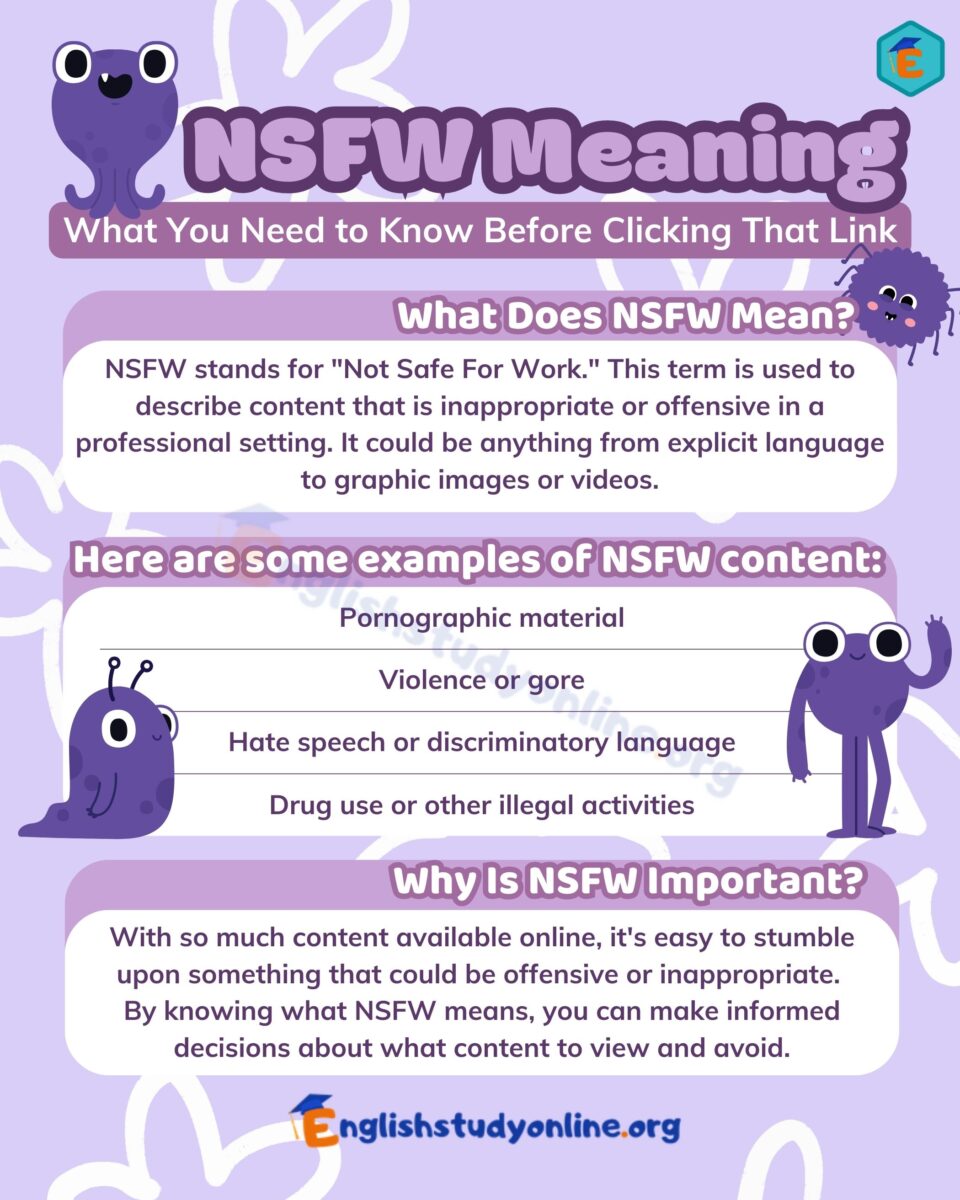Unraveling The Mystery Behind The Acronym

NFSW meaning has become a term frequently encountered in online discussions, particularly in the realm of social media and digital communication. This abbreviation, while seemingly obscure at first glance, holds significant implications in various contexts, particularly when it comes to content consumption. Understanding its true meaning can help users navigate the complex landscape of internet culture more effectively.
In a world where information spreads rapidly, it’s essential to stay informed about the language and acronyms used by internet users. The term NFSW not only signifies a warning but also reflects the evolving nature of communication in the digital age. As we delve deeper into its meaning, we will explore its origins, usage, and the impact it has on online interactions.
As our society becomes increasingly connected through technology, knowing the implications of terms like NFSW is crucial for engaging in healthy and appropriate discussions. This article aims to clarify the NFSW meaning and provide insights into its relevance in today's digital environment.
What Does NFSW Mean?
The acronym NFSW stands for "Not Safe for Work." This term is used to label content that may be inappropriate for viewing in a professional environment, such as explicit images, profanity, or adult themes. The usage of NFSW serves as a warning to individuals who may come across this content while at work or in public settings.
Why Is NFSW Important in Digital Communication?
Understanding the NFSW meaning is crucial for several reasons:
- It helps individuals avoid embarrassing situations in workplace environments.
- It promotes awareness about the nature of the content being shared online.
- It cultivates a more respectful digital community by recognizing boundaries.
Where Did the Term NFSW Originate?
The term NFSW emerged in the early days of internet forums and social media platforms. As users began sharing more explicit content, they recognized the need for a warning system to protect those who might inadvertently view this material in inappropriate settings. The acronym has since evolved, becoming a staple in online discourse.
How Is NFSW Used in Online Contexts?
NFSW is often employed in various online scenarios, including:
- Social media posts that include adult content.
- Links to websites featuring explicit material.
- Discussion forums where sensitive topics are addressed.
By tagging content with NFSW, users can inform others about the potential risks associated with viewing or engaging with that material.
What Are Some Alternatives to NFSW?
While NFSW is widely recognized, other acronyms convey similar meanings. Some alternatives include:
- NSFW (Not Safe for Work) - A more commonly used variant.
- PG-13 - Indicating content that may not be suitable for children.
- R-rated - Referring to movies or media that contain adult themes.
These alternatives serve the same purpose of warning individuals about explicit content, and users may choose to employ them based on their audience.
How Can One Avoid NFSW Content?
To minimize exposure to NFSW content, consider the following tips:
- Utilize content filters on social media platforms.
- Be cautious when clicking on links shared by others.
- Follow reputable sources that prioritize safe content sharing.
By implementing these strategies, individuals can navigate the internet more safely and responsibly.
Is NFSW Content Always Explicit?
Not all content labeled as NFSW is overtly explicit. Some materials may contain suggestive themes, strong language, or controversial opinions that could be deemed inappropriate in professional settings. It's essential to evaluate the context in which the term is used, as it can vary significantly based on the audience and platform.
How to React When Encountering NFSW Content?
When you come across content labeled with NFSW, consider the following actions:
- Assess the appropriateness of viewing the content based on your environment.
- Share with caution, ensuring that your audience is aware of the nature of the content.
- Report or block users who repeatedly share inappropriate material.
By approaching NFSW content mindfully, individuals can foster a safer online community.
Conclusion: Understanding NFSW Meaning for Safer Online Interactions
In conclusion, grasping the NFSW meaning is vital for anyone navigating the digital landscape. By recognizing the implications of this acronym, individuals can better protect themselves and others from inappropriate content. As our online communication continues to evolve, staying informed about such terms will contribute to a more respectful and aware community.
ncG1vNJzZmivp6x7o77EnKKepJxjwqx7wJuanaaVrMB3e82fqrBlnZqur7XNoGWhrJ2h
